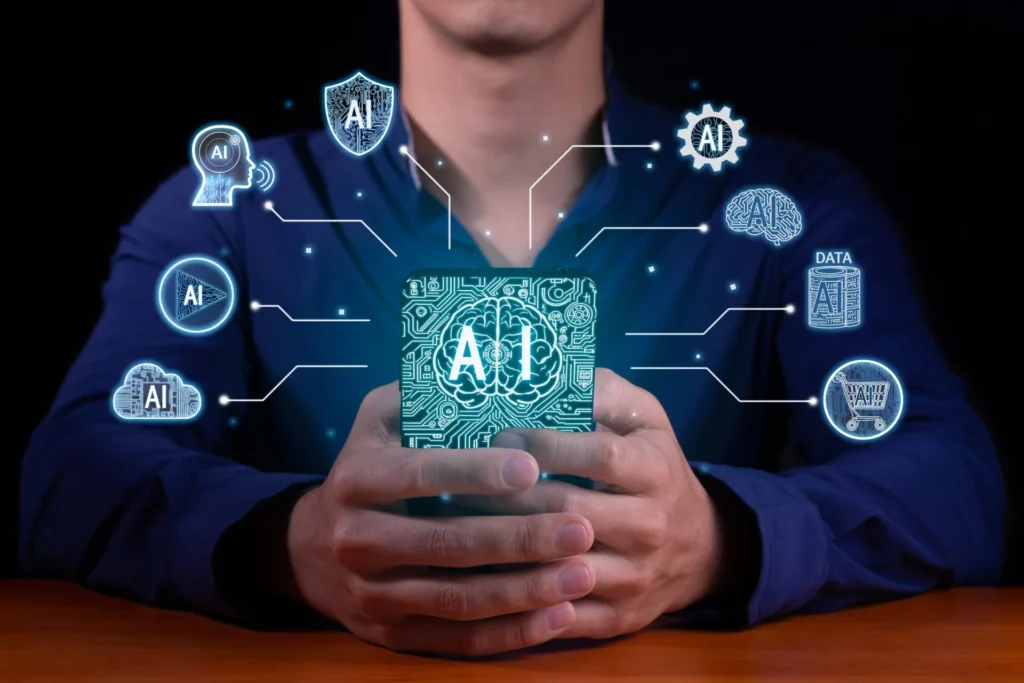Table of Contents

Introduction
The technological landscape between 2022 and 2024 witnessed an unprecedented surge in AI transformation. From automating mundane tasks to revolutionizing industry-specific workflows, this transformation has significantly reshaped the way businesses operate and individuals interact with technology. Despite challenges like data quality issues and talent retention, AI transformation continues to redefine industries with its promise of a smarter and more efficient future.
Revolutionizing Workflows: The Role of AI Transformation
1. AI Transformation in Automating Repetitive Tasks
The artificial intelligence transformation has led to the emergence of intelligent agents that automate repetitive tasks across industries. These systems operate autonomously, streamlining operations and boosting efficiency.
- Banking Sector: Screening and approving loan applications has become faster and error-free with AI-driven systems.
- Healthcare: AI summarizes critical medical data, enabling doctors to make precise and timely decisions.
AI agents improve their performance through self-learning, distinguishing them from traditional AI systems. This self-improvement capability highlights the transformative potential of AI across sectors.
2. AI Transformation as a Co-Pilot for Humans
A significant aspect of the artificial intelligence transformation is its ability to complement human intelligence by processing vast datasets. It offers:
- Trend Analysis: Identifying patterns for predictive insights.
- Data-Driven Decisions: Generating actionable visualizations and forecasts.
By handling data-heavy tasks, artificial intelligence transformation allows humans to focus on creative and strategic pursuits.
3. AI Transformation in Data Accessibility with GenAI Dashboards
Generative AI (GenAI) tools epitomize AI transformation by replacing traditional dashboards with more intuitive systems. They enable:
- Conversational interfaces for seamless analytics and trend predictions.
- Simplified access to complex datasets without requiring advanced skills.
These innovations underline the accessibility and democratization brought about by AI transformation in data handling and analysis.
AI Transformation in Social Media Platforms
The AI transformation has reshaped social media by introducing personalized and localized user experiences. Closed-group platforms, driven by AI algorithms, now challenge traditional platforms like Facebook and Twitter. These platforms foster niche, community-focused interactions, ensuring more tailored and engaging digital environments.
Current Applications: AI Transformation Across Industries
1. Enhanced Reasoning and Multimodal AI Transformation
The latest advancements in artificial intelligence , such as OpenAI’s GPT-4 and Meta’s Llama 3.2, showcase the artificial intelligence transformation in reasoning and multimodal processing. These models integrate text, visuals, and auditory data to deliver holistic insights and solutions.
2. AI Transformation in Consumer Devices
The integration of AI into consumer electronics exemplifies the artificial intelligence transformation in real-time applications. From smartphones to wearables, companies like Apple and Qualcomm are leveraging AI to provide personalized user experiences and hands-free operations.
3. Open-Source Contributions to AI Transformation
The open-source movement has bolstered the AI transformation, allowing businesses to customize and adapt AI models like Mistral AI and Meta’s Llama. This transparency and flexibility are critical for innovation and broader adoption.
Future of AI Transformation: What’s Next?
1. Mainstreaming AI Transformation with AI Agents
AI agents are central to the ongoing AI transformation. These intelligent systems will autonomously manage task-based workflows, enhancing productivity with minimal human intervention.
2. Next-Generation Hardware Driving AI Transformation
Innovative hardware, such as AI-driven processors and quantum chips, is set to drive the AI transformation further. Devices like the rumored “OpenAI phone” could redefine device ecosystems, relying solely on AI for functionality.
3. Social Media Reinvention Through AI Transformation
The AI transformation will likely lead to the creation of unconventional social media platforms that prioritize closed-group interactions and personalized user experiences, reshaping digital communication.
4. Advanced Computational Ecosystems Fueling AI Transformation
High-performance processors, like NVIDIA GPUs, are enabling breakthroughs in AI models. These developments amplify the AI transformation by solving complex challenges in fields such as climate modeling and precision agriculture.
5. Ethical AI Transformation and Responsible Development
As this progresses, regulatory frameworks and ethical guidelines will become essential. These measures will address challenges of accountability, fairness, and security.
Challenges in the Path of AI Transformation
1. Economic Viability of AI Transformation
The artificial intelligence transformation demands significant investment, often with delayed returns. Companies must find the right balance between scaling AI systems and maintaining profitability.
2. Data Complexity and the “Data Wall” in AI Transformation
AI systems are reaching a “data wall,” where performance gains plateau due to limitations in training data. Addressing this hurdle is crucial for sustaining this transformation.
3. Security Risks in AI Transformation
The increasing reliance on AI heightens vulnerabilities to cyberattacks. Ensuring robust security measures is vital to protect data and maintain trust in the AI transformation.
4. Workforce Challenges Due to AI Transformation
Automation driven by the this transformation may displace roles in repetitive jobs. Upskilling programs are necessary to equip the workforce for new opportunities created by AI.
5. Sustainability Concerns in artificial intelligence Transformation
The energy demands of AI models pose environmental challenges. Sustainable practices must be integrated into the artificial intelligence transformation to minimize ecological impact.
6. Deepfake Technology and Ethical Issues
Deepfake technology, enabled by the artificial intelligence transformation, raises concerns about misinformation and ethical misuse. Effective regulations are critical to mitigate these risks.
Expanding Horizons
The potential of AI transformation is boundless. From personalized healthcare to precision agriculture, AI continues to enhance efficiencies and unlock new opportunities.
However, addressing challenges like data complexity, security, and sustainability will be crucial to harnessing the full potential of the artificial intelligence transformation. By fostering responsible innovation, the future of AI can be both impactful and inclusive.
Noodlemagazine I truly appreciate your technique of writing a blog. I added it to my bookmark site list and will